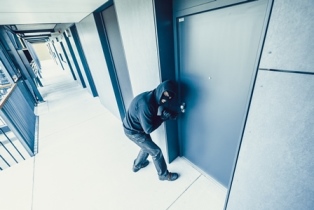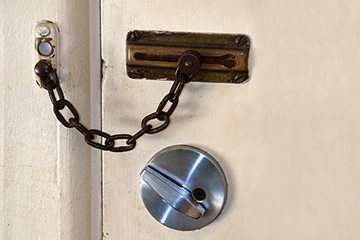Keeping safe: At home

Your home is the place where you feel safe and comfortable. It's the place where you relax and get together with friends and family. When somebody burgled your home it not only impacts on you financially, but also emotionally.
House burglaries were reported as the most common and feared crime in South Africa in the 2016/17 Victims of crime survey. Most burglaries take place during the day when people are at work.
To help you consider your home's security measures, we've compiled a list of items that you should prioritise to increase the safety of your family and your belongings.
Fences and Walls
A high fence around the house with lockable gates is much safer than a high wall due to the improved visibility it provides.
Make sure that your gates are locked at all times and that any keys can't be reached easily. Consider installing security gates with sturdy locks in front of each home access door, as well as burglar bars on vulnerable windows.
Here are some other measures that prevent easy access to your property:
- Security doors and gates.
- Razor wire.
- Additional locking devices and safety chains on doors.
- Strengthening of doors.
- Peepholes on doors.
- Intercom system between the home and gate, front door or garage.
 Alarm systems
Alarm systems
An alarm system connected to an armed response company can act as an effective deterrent to burglars. Ideally, a few switches/panic buttons should also be installed throughout the house.
There are many types of alarm systems, and not all is costly. Here are a few examples:
- A mechanical and/or electrical alarms, which is an alarm system that often consists of an alarm control panel, sensors and alerting devices. This requires a security company to install it.
- Gravel on window panes, pathways or around the home. Gravel will make a noise when an intruder walks on it. The noise might scare away a potential intruder.
- Obstacles that can make a noise when moved. Place items, such as glass vases or pot plants, close to your doors and windows.
Security lights
Security lights on the outside of the house improve the physical protection of a house, farm or smallholding.
These lights must be directed away from the house and must allow the occupants to use the windows without being observed from the outside.
Be aware of possible shadows and blind spots.
Safety precautions
Ensure that all doors are locked at all times and that windows are closed when you're not at home.
Large dogs serve as a deterrent. At least 1 dog should be trained to sleep inside the house.
If you leave your house for longer than a day, inform your family, neighbours or friends of your intended destination. Let them know the time you expect to return and the route you will be driving, especially if you live in a rural or farming area.
Ensure that tools such as axes, spades, picks and ladders that can be used to gain access to your house are locked away when you're not using them.
Vary your daily routine and the times that you travel to and from work.
Always keep a torch nearby at night and when you use it, ensure that you don't give away your position.
If you're unsure about the security status of your home after returning from work or a visit, don't enter your home. Go to your neighbour, and contact the police and your security company if you have one.

Access and key control
Don't allow strangers on your premises or in your house without having properly identifying the person, especially at night.
Identify keys by means of codes instead of writing labels showing which gate or door the key can be used for.
Keys to the safe must be kept on the person. Never hide any keys in traditional places, such as in pot plants or under doormats. Keys in the keyhole on the inside of the door should be turned to avoid easy removal. Never allow strangers to handle keys and immediately change locks when keys are lost.
Make sure to save the contact number of your nearest police station on your cellphone or an easy accessible place to report suspicious behaviour.
Communication
If possible, it's a good idea to have multiple reliable options for emergency communication, such as a landline, cellphone, or even a two-way radio shared with a neighbour.
Make sure that your telephone is always within reach.
Inform your children not to give an indication that adult supervision is not available when they answer the phone and keep these numbers saved on your cellphone or visible next to your landline:
SAPS Crime Stop : 08600 10111
SAPS Emergency line : 10111


